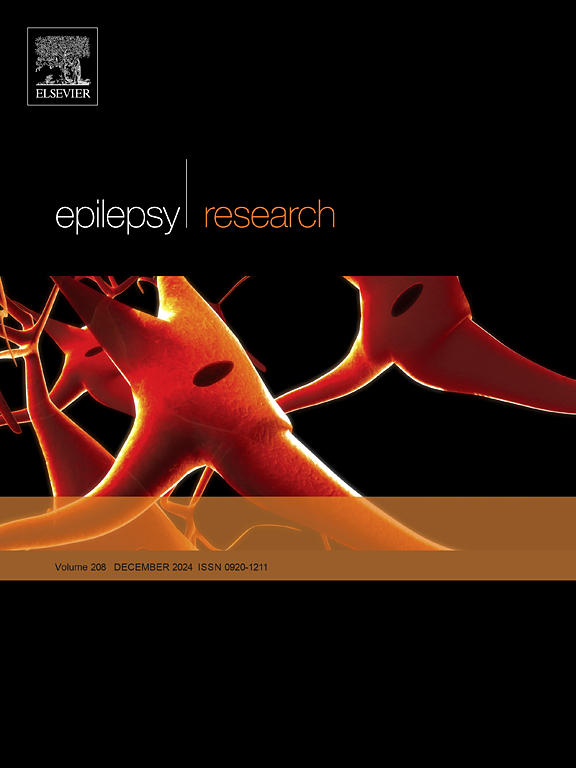Evaluating the late seizures of acute encephalopathy with biphasic seizures and late reduced diffusion via monitoring using continuous electroencephalogram
IF 2
4区 医学
Q3 CLINICAL NEUROLOGY
引用次数: 0
Abstract
Background
Acute encephalopathy with biphasic seizures and late reduced diffusion (AESD) causes clustered seizures (late seizures; LS) 3–7 days after early seizure (ES); however, few reports provide continuous electroencephalogram (C-EEG) monitoring details. This study aimed to evaluate the initial/last detection date of LS using C-EEG and determine whether LS EEG features correlate with neurological sequelae.
Materials and methods
We analyzed 28 patients diagnosed with AESD who underwent C-EEG monitoring between 2015 and 2020. Multiple pediatric neurologists and epileptologists evaluated the LS detection timing, duration, and severity. Based on the evaluated data, we compared the clinical characteristics and LS-induced neurological sequelae between the ESEEG+LS (initiated C-EEG immediately after ES) and LSEEG+LS (initiated C-EEG after LS confirmation) groups. Additionally, we compared LS clinical characteristics and severity between severe and non-severe groups for 15 patients (baseline Pediatric Cerebral Performance Category Scale score <3).
Results
LS was detected in 17 of 28 patients. The earliest and latest LS detection dates were 2 and 11 days, respectively, and the longest LS duration was 7 days (median, 0.6 days). Regarding neurological sequelae, the LS duration was markedly longer in the severe group than that in the non-severe group during the distant period. However, LS severity was not associated with neurological sequelae.
Conclusion
This study highlights the importance of C-EEG as it could aid in the early detection of LS. Neurological sequelae correlated with LS duration but not severity.
通过连续脑电图监测,评估急性脑病晚期发作与双相发作和晚期弥散功能减退的关系。
背景:急性脑病伴双相发作和晚期弥散减少(AESD)会在早期发作(ES)后3-7天引起聚集性发作(晚期发作;LS);然而,很少有报道提供连续脑电图(C-EEG)监测的详细信息。本研究旨在使用 C-EEG 评估 LS 的初始/最后检测日期,并确定 LS 的脑电图特征是否与神经系统后遗症相关:我们分析了 2015 年至 2020 年期间接受 C-EEG 监测的 28 例确诊为 AESD 的患者。多名儿科神经学家和癫痫专家对 LS 的检测时间、持续时间和严重程度进行了评估。根据评估数据,我们比较了 ESEEG+LS 组(ES 后立即启动 C-EEG)和 LSEEG+LS 组(LS 确认后启动 C-EEG)的临床特征和 LS 引发的神经系统后遗症。此外,我们还比较了 15 名患者(基线小儿脑功能分类量表评分结果)的重度和非重度组 LS 临床特征和严重程度:28 例患者中有 17 例检测出 LS。最早和最晚发现 LS 的日期分别为 2 天和 11 天,最长的 LS 持续时间为 7 天(中位数为 0.6 天)。在神经系统后遗症方面,严重组的 LS 持续时间明显长于远期的非严重组。然而,LS严重程度与神经系统后遗症无关:本研究强调了 C-EEG 的重要性,因为它有助于早期发现 LS。神经系统后遗症与 LS 持续时间相关,但与严重程度无关。
本文章由计算机程序翻译,如有差异,请以英文原文为准。
求助全文
约1分钟内获得全文
求助全文
来源期刊

Epilepsy Research
医学-临床神经学
CiteScore
0.10
自引率
4.50%
发文量
143
审稿时长
62 days
期刊介绍:
Epilepsy Research provides for publication of high quality articles in both basic and clinical epilepsy research, with a special emphasis on translational research that ultimately relates to epilepsy as a human condition. The journal is intended to provide a forum for reporting the best and most rigorous epilepsy research from all disciplines ranging from biophysics and molecular biology to epidemiological and psychosocial research. As such the journal will publish original papers relevant to epilepsy from any scientific discipline and also studies of a multidisciplinary nature. Clinical and experimental research papers adopting fresh conceptual approaches to the study of epilepsy and its treatment are encouraged. The overriding criteria for publication are novelty, significant clinical or experimental relevance, and interest to a multidisciplinary audience in the broad arena of epilepsy. Review articles focused on any topic of epilepsy research will also be considered, but only if they present an exceptionally clear synthesis of current knowledge and future directions of a research area, based on a critical assessment of the available data or on hypotheses that are likely to stimulate more critical thinking and further advances in an area of epilepsy research.
 求助内容:
求助内容: 应助结果提醒方式:
应助结果提醒方式:


